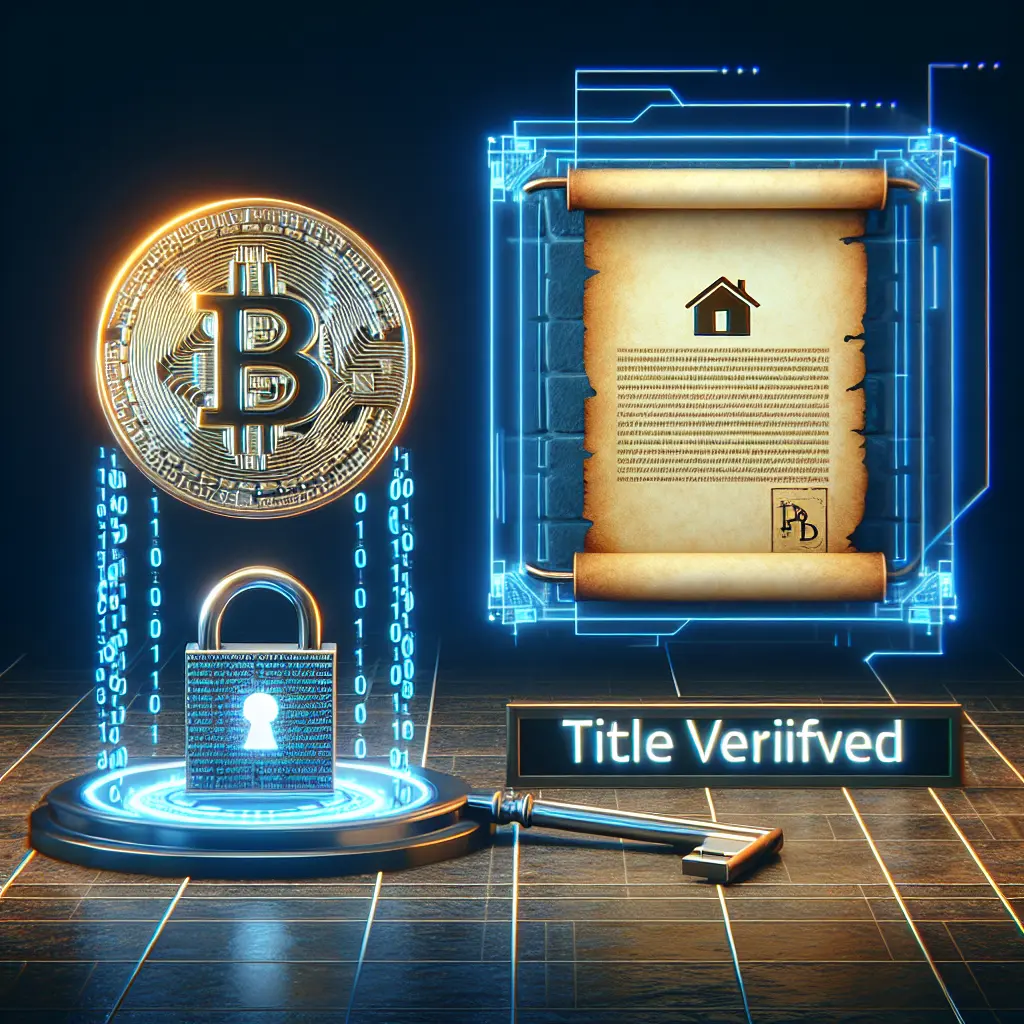In the dynamic realm of real estate, the integration of Bitcoin and blockchain technology is proving to be a game-changer, transforming traditional title verification processes. As cryptocurrency gains traction across various industries, Bitcoin in real estate emerges as a revolutionary force, paving the way for enhanced efficiency and security in property transactions. The cumbersome and often error-prone methods of verifying property deeds are being replaced by Bitcoin title verification and blockchain real estate solutions, offering a streamlined approach to managing digital real estate titles.
This innovation is particularly significant for real estate professionals who are now embracing decentralized title verification systems. By leveraging blockchain property records, Bitcoin property transactions become transparent and immutable, reducing fraud and enhancing trust. The implications for title insurance are profound, as Bitcoin for title insurance introduces a new level of assurance and reliability.
Moreover, the role of cryptocurrency in real estate extends beyond mere transactions. With Bitcoin smart contracts in real estate, property deals are executed seamlessly, ensuring that all contractual terms are met without the need for intermediaries. This digital ledger in real estate not only simplifies processes but also democratizes access to property ownership, fostering a more inclusive market.
As we delve deeper into the transformative potential of blockchain real estate technology, it becomes evident that Bitcoin's impact on real estate is not just a fleeting trend but a lasting innovation. This journey into the future of real estate begins with understanding how cryptocurrency title verification and Bitcoin land registry are reshaping the industry landscape. Discover the future of property transactions and ownership as we explore these groundbreaking developments further.
In recent years, the integration of Bitcoin in real estate has emerged as a transformative force, fundamentally altering how title verification processes are conducted. Traditionally, verifying property deeds involved cumbersome paperwork, manual checks, and potential human errors, creating opportunities for fraud and inefficiencies. However, the advent of blockchain real estate technology is rapidly changing this landscape.
The Shift to Digital Real Estate Titles
One of the most significant shifts facilitated by cryptocurrency in real estate is the transition to digital real estate titles. By leveraging blockchain property records, real estate professionals can ensure that Bitcoin property transactions are transparent and immutable. This decentralization of title verification means that all stakeholders have access to a single, unalterable source of truth, significantly reducing the risk of fraudulent activities.
Example in Practice: In 2023, a notable project in Wyoming successfully utilized Bitcoin title verification to streamline its property transaction processes. By adopting blockchain real estate solutions, the project reduced transaction times by 50% while ensuring all parties had access to verifiable and secure digital records.
Enhancing Trust with Blockchain Property Records
Blockchain technology offers a reliable framework for maintaining property records. These records are decentralized and encrypted, making them highly resistant to tampering and unauthorized access. This shift towards a digital ledger in real estate is not only enhancing trust but also offering an unprecedented level of security.
Bitcoin Smart Contracts: Revolutionizing Transactions
Bitcoin smart contracts in real estate introduce automation and efficiency by executing transactions based on predefined conditions without the need for intermediaries. This approach ensures that property deals are executed seamlessly and with minimal friction.
Consider this scenario: A buyer and seller agree on a property sale using a Bitcoin smart contract. Once all contractual terms are met—such as the buyer transferring Bitcoin to an escrow account and the seller providing proof of ownership—the smart contract automatically releases the funds and updates the blockchain land registry. This process eliminates delays typically caused by manual verifications.
Decentralized Title Verification Systems
Decentralized title verification offers numerous advantages over traditional systems. By eliminating central points of failure, these systems provide enhanced security and resilience against cyber-attacks. Moreover, they empower individuals by granting them greater control over their own property data.
Implications for Title Insurance
The introduction of Bitcoin for title insurance marks another significant advancement in the field. With immutable records provided by blockchain technology, insurers can offer policies with greater confidence and at lower costs. This enhances overall efficiency and reduces premiums for buyers.
A report from Deloitte suggests that integrating blockchain in title insurance could save the industry over $1 billion annually by minimizing fraud and improving data accuracy.
Democratizing Property Ownership
The use of cryptocurrency title verification is democratizing access to property ownership. By lowering barriers to entry and simplifying the buying process, more people can participate in real estate markets previously inaccessible to them.
Future Outlook
As more real estate professionals embrace blockchain for their operations, we can expect further innovations that will continue to reshape the industry. The integration of Bitcoin land registry systems and cryptocurrency-based transactions promises to make property dealings more efficient, secure, and transparent.
In conclusion, while the serialized articles may have illustrated these changes with varying degrees of detail, the overarching trend is clear: Bitcoin's role in transforming real estate title verification is not just a passing trend but a significant evolution in how we perceive and conduct property transactions today. With ongoing advancements and growing adoption, the future of real estate looks poised for further disruption and innovation.
Key advancements include:
- Digital Real Estate Titles: Utilizing blockchain technology, these titles offer transparency and security, reducing fraud risks and inefficiencies.
- Blockchain Property Records: By maintaining decentralized and encrypted records, blockchain enhances trust and security in property transactions.
- Bitcoin Smart Contracts: These introduce automation and efficiency, allowing seamless property deals without intermediaries.
- Decentralized Title Verification: Providing enhanced security and resilience, these systems empower individuals with greater control over their property data.
- Title Insurance and Cost Savings: Blockchain technology minimizes fraud and improves data accuracy, potentially saving the industry significant costs.
- Democratizing Property Ownership: Fractional ownership through tokenization lowers barriers, enabling broader participation in real estate markets.
As the real estate sector continues to embrace these innovations, the potential for further disruption and enhancement is vast. The shift towards blockchain-based solutions promises to make property dealings more efficient, secure, and accessible to a wider audience.
We invite you to reflect on how these changes could impact your experience in the real estate market. Have you encountered blockchain technology in your property dealings? Share your insights and experiences in the comments below.
Thank you for joining us on this journey through the evolving landscape of real estate. Until next time, stay curious and open to the possibilities that innovation can bring!










Leave a Comment